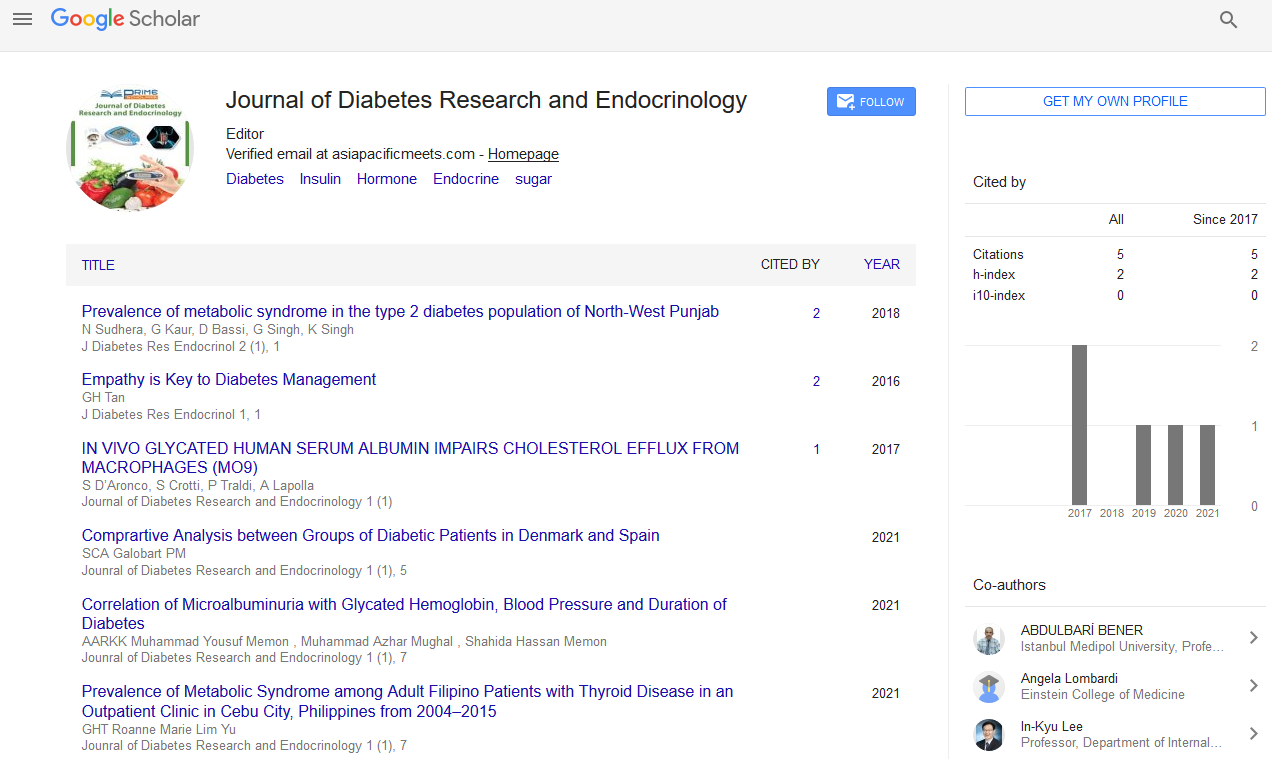Commentary - (2024) Volume 8, Issue 3
Understanding C-Peptide: A Key Biomarker in Diabetes Management
Hiroshi Suzuki*
Department of Diabetes, Japan University, Japan
*Correspondence:
Hiroshi Suzuki,
Department of Diabetes, Japan University,
Japan,
Email:
Received: 02-Sep-2024, Manuscript No. PJDRE-24-21870;
Editor assigned: 04-Sep-2024, Pre QC No. IPJDRE-24-21870 (PQ);
Reviewed: 18-Sep-2024, QC No. IPJDRE-24-21870;
Revised: 23-Sep-0024, Manuscript No. IPJDRE-24-21870 (R);
Published:
30-Sep-2024, DOI: 10.36648/ipjdre.08.03.27
Description
C-peptide, or connecting peptide, is a short peptide that
plays a crucial role in the synthesis and regulation of insulin.
It is produced by the pancreas during the formation of
insulin and serves as an important biomarker for assessing
insulin production and pancreatic function. Understanding
C-peptide can provide valuable insights into the diagnosis
and management of diabetes and other metabolic disorders.
C-peptide is a byproduct of insulin production. When
proinsulin, a precursor to insulin, is synthesized in the
pancreatic beta cells, it is split into two components: Insulin
and C-peptide. While insulin is released into the bloodstream
to regulate blood glucose levels, C-peptide is released in equal
amounts but has no direct role in glucose metabolism. Instead,
its presence in the blood serves as an indicator of how much
insulin the pancreas is producing. C-peptide testing is primarily
used to assess pancreatic function in individuals with diabetes.
This testing can help differentiate between type 1 and type
2 diabetes, as well as evaluate the effectiveness of certain
treatments. Here are key applications of C-peptide testing: In
type 1 diabetes, the immune system attacks and destroys the
insulin-producing beta cells in the pancreas, leading to little or
no insulin production. This results in low levels of C-peptide.
In contrast, individuals with type 2 diabetes often produce
insulin but may have insulin resistance, leading to normal or
elevated C-peptide levels. Testing C-peptide levels can help
clinicians determine the type of diabetes and tailor treatment
plans accordingly. C-peptide levels can provide insight into
how well the pancreas is functioning. In people with type
2 diabetes, monitoring C-peptide can help assess whether
the pancreas is still producing insulin and how effectively it
responds to treatment. In cases of unexplained hypoglycemia
(low blood sugar), measuring C-peptide levels can help
identify the underlying cause. Elevated C-peptide levels in the
presence of low blood sugar may indicate endogenous insulin
overproduction, while low levels could suggest inadequate
insulin production. For individuals undergoing treatment
for diabetes, C-peptide testing can help evaluate how well
medications or lifestyle changes are enhancing insulin
production and overall metabolic control. C-peptide levels are
typically measured through a blood test and are reported in
nanograms per milliliter (ng/mL). Normal C-peptide levels can
vary based on the individual and the specific circumstances but
generally range from 0.5 ng/mL to 2.0 ng/mL. Elevated levels
may indicate insulin resistance or conditions like insulinomas
(insulin-producing tumors), while low levels suggest insufficient
insulin production. While C-peptide testing is a valuable tool,
it is not routinely performed in all diabetes patients. It is
generally ordered when there is ambiguity in the diagnosis or
to monitor specific cases. It is important to interpret C-peptide
levels in conjunction with clinical findings and other laboratory
results for a comprehensive assessment of an individual’s
metabolic health. C-peptide serves as a crucial biomarker
for assessing insulin production and pancreatic function,
making it an essential tool in the management of diabetes. By
understanding the implications of C-peptide testing, healthcare
providers can better differentiate between types of diabetes,
evaluate insulin production, and tailor treatment strategies for
optimal patient outcomes. As research continues to advance
our understanding of diabetes and its management, C-peptide
will remain an important focus for improving the health and
quality of life for those affected by this complex condition.
Acknowledgement
None.
Conflict Of Interest
None.
Citation: Suzuki H (2024) Understanding C-peptide: A Key Biomarker in Diabetes Management. J Diab Res Endocrinol. 8:27.
Copyright: © 2024 Suzuki H. This is an open-access article distributed under the terms of the Creative Commons Attribution
License, which permits unrestricted use, distribution, and reproduction in any medium, provided the original author and source
are credited.

